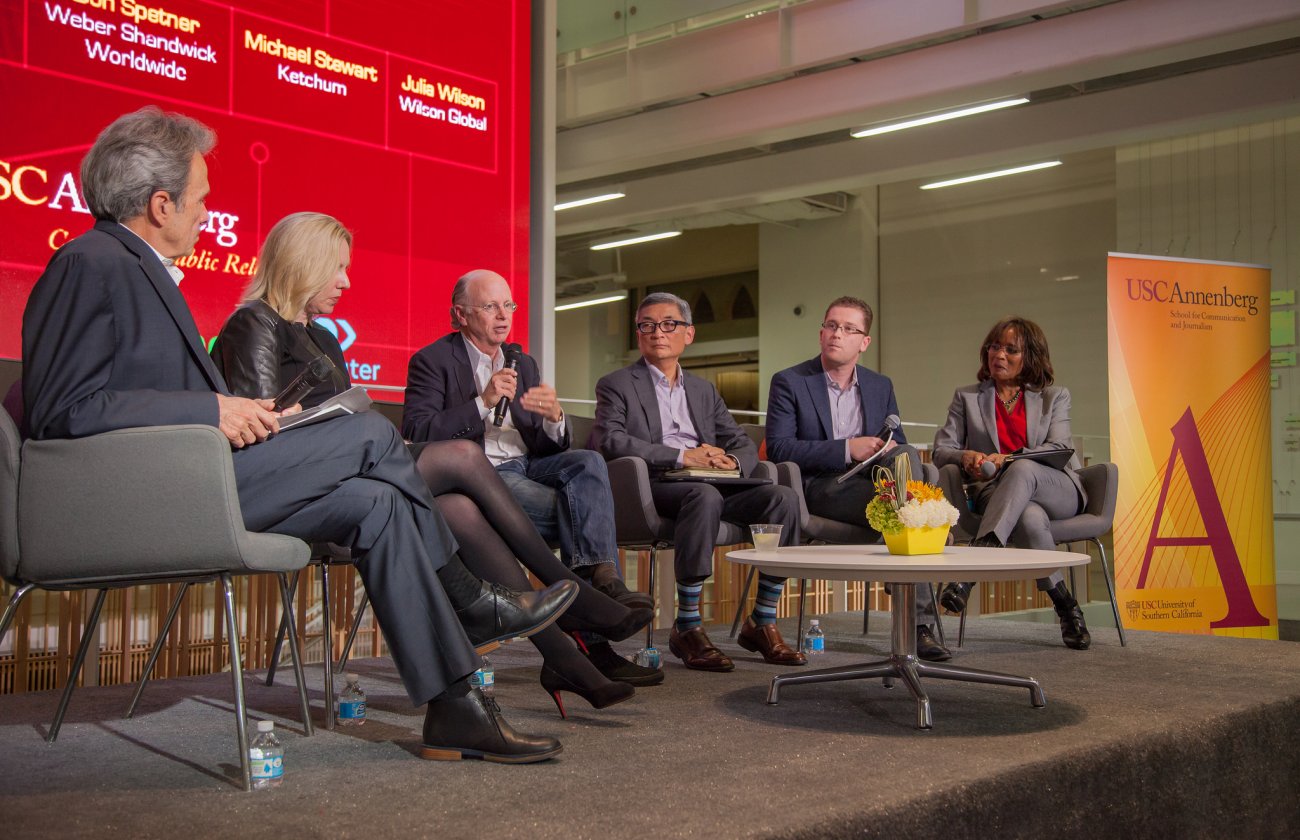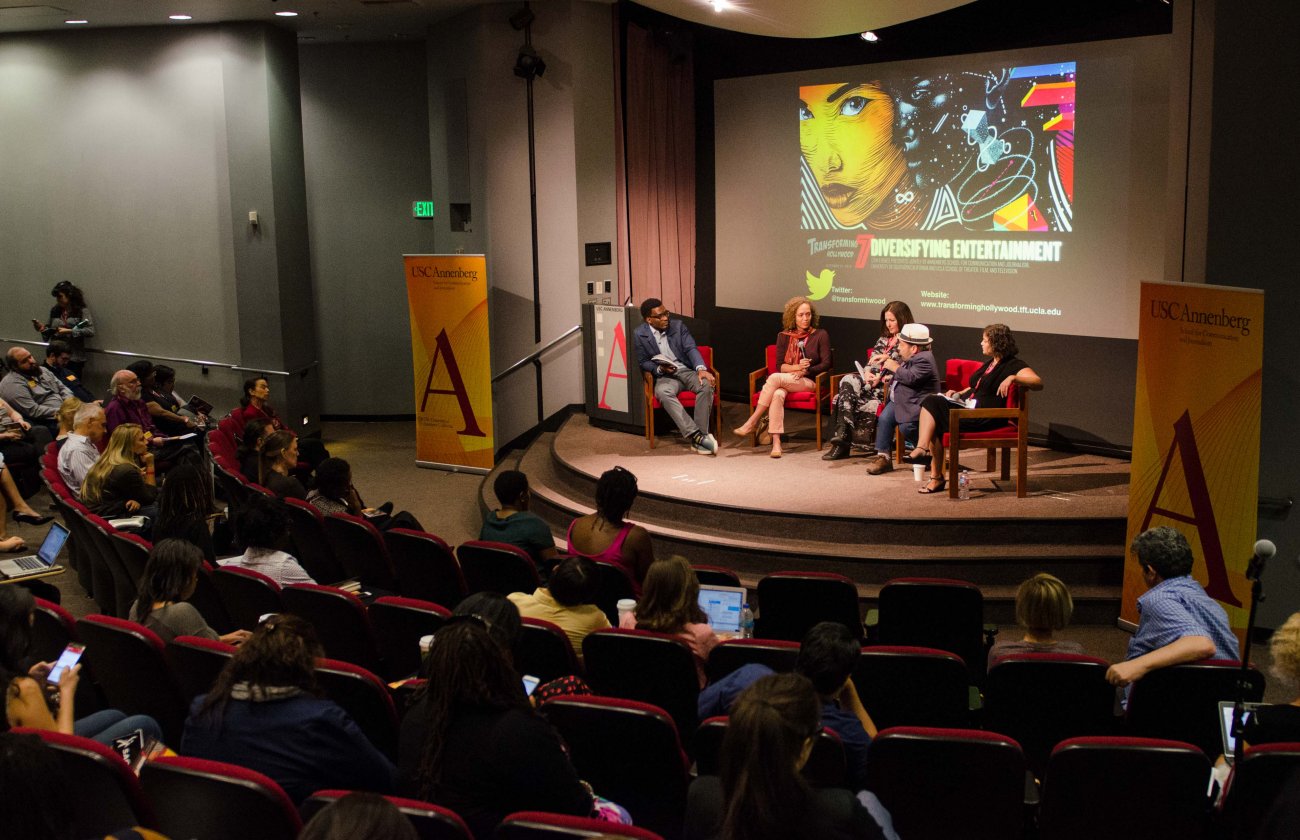By Jackson DeMos
Television and radio host Tavis Smiley entertained and inspired USC Annenberg students with political commentary and career advice at an April 17 roundtable discussion in the School’s west lobby.
Smiley’s discussion focused on advice for students, a critique of politicians and mainstream media, and an argument for the importance of public media. He drew upon his life as a broadcaster, author, publisher, advocate and philanthropist to guide students in their own professional lives and update them on the state of public broadcasting.
He urged students to constantly push themselves to do their best work so they can succeed in whatever profession they choose. The student-centered discussion precipitated Smiley’s keynote address at the James L. Loper Lecture in Public Service Broadcasting, which USC Annenberg hosted later in the evening in downtown Los Angeles.
“In the end it’s the high quality level of work that’s going to get you over the top,” said Smiley, who hosts shows on PBS and Public Radio International and was named one of Time Magazine’s 100 most influential people in the world. “If you are the best at what you do, the world will find you. Just keep pushing and pushing, and if your stuff is that good somebody will discover you.”
Smiley also advised students to take advantage of the opportunities they have at USC Annenberg.
“You are blessed to be here,” Smiley said. “I was looking yesterday at your faculty list, and the professors you are taught by are an august group of people. Thank you for the work you’re doing and the invitation to be here today.”
While introducing Smiley to the audience, Dean Ernest J. Wilson III told students, faculty and staff that they were “in for a treat.”
“We’re absolutely delighted to have Tavis Smiley here, which is the latest example of what we call the ‘Annenberg Advantage.’ I want to personally thank him as a friend and colleague for sharing his experiences with our students and for speaking at our distinguished Loper Lecture series.”
Dean Wilson also introduced Smiley at the James L. Loper Lecture in Public Service Broadcasting, held at the California Club. Dean Wilson described to the audience, which included USC Trustee Frank Cruz and LA County Supervisor Mark Ridley-Thomas, how USC Annenberg’s goals align with those of public media. He pointed to similarities in the missions of public broadcasting and the Annenberg School, including advancing dialogue, diversity and digital tools for better communication.
Since its inception in 2005, the Loper Lecture has featured prominent leaders such as Vivian Schiller, the then-head of NPR; Brian Lamb, the founder of C-SPAN; Dr. William F. Baker, the leader of WNET and WLIW; David Fanning, the founder and executive producer of Frontline; and Judy Woodruff, co-anchor of PBS Newshour.
“Public television and radio are more necessary and relevant now than ever before,” Smiley said. “Some questions just don’t get asked if we don’t ask them. Some issues don’t get raised and some conflicts around the world don’t get covered if we don’t cover them.”
He said public media is especially needed in today’s fragmented and filtered media environment.
“The most trusted source in this country for years running – more than the White House, Congress, Supreme Court, and network news – is public media. It has been PBS and NPR for years running, and it isn’t even close.”
Smiley said he has been called a lot of names as an outspoken public media voice, but he has not been called a liar.
“Nobody is going to push back against the facts,” he said. “Am I right about the poverty numbers, the suffering, the unemployment, underemployment, and drones? It’s about putting facts on the table and debating them.”
He told students it is important to seek the truth in their roles as members of the media.
“If you’re going to be a journalist – I’d never call myself a journalist because I’m not trying to be fair and balanced – if you’re going to report the news, you need to tell the truth about the conditions in this country,” Smiley said.
He added that mainstream media and politicians often gloss over delicate issues such as poverty. He said, for example, that journalists have talked about a “jobless recovery” from the recession, which he said is impossible because you can’t have a true recovery without jobs.
After moderator and journalism professor Marc Cooper announced that time for discussion was over, the audience let out a groan. Smiley then insisted that he be able to answer a few more student questions before leaving to deliver the Loper Lecture.
Students applauded him for staying extra time, and Smiley left them with more valuable advice, including:
- Look for topics and ideas that won’t get covered.
- When you put facts on the table and tell the truth, people get it.
- People would rather see a sermon than hear a sermon: You need to be a living example of the things you talk about.
- Bring your own unique flavor. Put your own stamp on it. Do it the way you want.
- Interviews and conversations are two different things. You don’t want interviews, you want conversations.
- Commit yourself to doing what you want to do. At end of day what matters is whether you come prepared.
As Smiley’s roundtable discussion ended, the audience stood and applauded. One alumna in attendance, Adena Andrews, smiled and said, “I needed that.”









